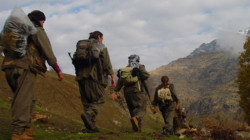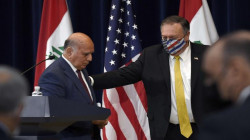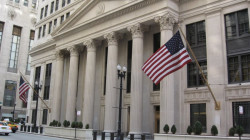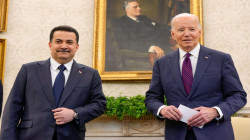Source: Iraqi PM's visit to Washington to prioritize economic ties over security
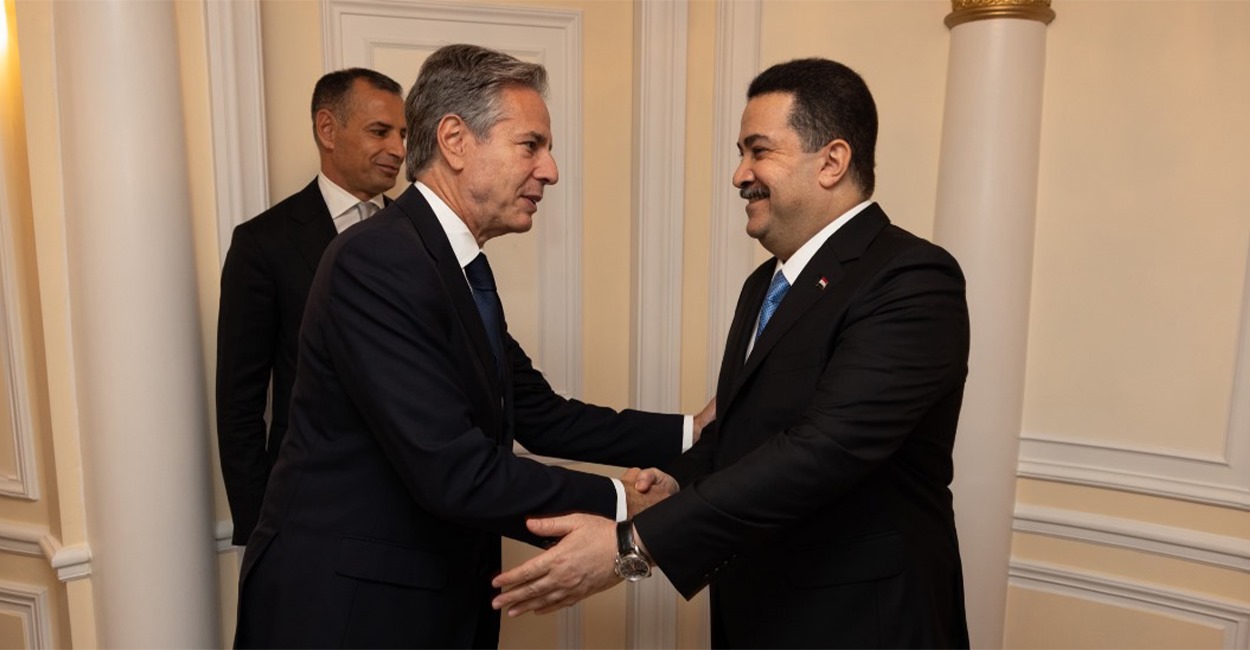
Shafaq News/ Marking his first visit to the United States since assuming office in October 2022, Iraqi PM Mohammed Shia Al-Sudani headed a high-level delegation in an official visit to discuss various issues of common interests.
A government source unveiled to Shafaq News Agency details of Al-Sudani's visit to Washington, which marks a diplomatic endeavor.
According to the source, the 5-day visit encompasses three states, Washington, Michigan, and Houston, "showcasing a comprehensive engagement with various sectors and stakeholders."
"Al-Sudani is scheduled to meet with key figures, including US President Joe Biden, Secretary of State Antony Blinken, and the Secretary of Defense, Lloyd Austin, at the Pentagon to delve into crucial bilateral matters." The source explained.
Additionally, Al-Sudani's itinerary includes sessions with representatives from US energy companies and engagements with the Iraqi community across the visited states "to foster deeper ties and explore avenues for collaboration beyond traditional diplomatic spheres."
Al-Sudani is accompanied by a delegation comprising government officials, parliamentarians, and business leaders. Notably, the source pointed out that the absence of a high-ranking Iraqi security official from the delegation highlighted a "strategic shift towards cooperation in other fields including economy and developmental agendas in the Iraq-US partnership."
"The visit is strategically aligned with Iraq's vision of expanding cooperation with the United States, particularly in economic domains outlined in the U.S.-Iraq Strategic Framework Agreement. Al-Sudani seeks to activate provisions across seven sectors in the Agreement."
The Strategic Framework Agreement guides overall political, economic, cultural, and security ties with Iraq.
Initiatives like the Strategic Development Road Project, which has the potential to enhance regional connectivity and foster economic prosperity, will be central to discussions, said the source, "The delegation will also engage in talks regarding strategic gas projects and the ongoing dialogue concerning the Global Coalition's mission in Iraq."
Earlier, a senior State Department official revealed that al-Sudani's upcoming visit to Washington will emphasize economic ties more than the security and defense relationship between the United States and Iraq.
Speaking on condition of anonymity during a briefing with reporters on Thursday, the official clarified that "while discussions on defense and security matters will be part of the agenda, they will not be the primary focus of Sudani's visit."
"The visit's primary focus will center on enhancing economic cooperation, with discussions extending to areas such as education, environmental initiatives, and US support for development projects in Iraq." He explained.
Notably, Iraqi-American relations have encountered numerous challenges, oscillating between periods of deterioration and improvement based on regional circumstances. Following the 2003 invasion of Iraq, justified on grounds of weapons of mass destruction, and the subsequent overthrow of Saddam Hussein's regime, American influence expanded significantly. However, the "envisioned transition to democracy" led to widespread destruction, impacting Iraq's culture, populace, and heritage.
Furthermore, the rise of ISIS further complicated matters, prompting the United States, within the Global Coalition framework, to join forces with the Iraqi army, Popular Mobilization Forces, and Peshmerga in combating the terrorist group.
Although Washington announced a withdrawal from Iraq in 2011, it maintained a presence through ongoing operations as part of the Global Coalition.
Over the past decade, most Iraqi prime ministers have made public calls for the withdrawal of US military forces from their country. Prime Minister Ibrahim al-Jaafari initiated this in 2005, followed by Nouri al-Maliki in 2008, Adel Abdul-Mahdi in 2020, and Mohammed Shia al-Sudani, the current prime minister, in December 2023. These requests have often been influenced by Iranian-backed groups in Iraq (The Coordination Framework).
The presence of foreign troops in Iraq has emerged as a significant issue, gaining prominence following the targeted killing of top Iranian general Qasem Soleimani and the leader of an Iran-backed leader, Abu Mahdi Al-Muhandis, in a US drone strike in Baghdad in January 2020, when the Iraqi parliament passed a non-binding resolution calling the government to end the presence of all foreign troops.
In December 2021, the US-led Coalition ended its combat mission in Iraq four years after helping the Iraqi forces in defeating ISIS.
Last January, a joint Higher Military Commission (HMC) between Iraq and the US-led Coalition in Baghdad was established. Three subcommittees were also formed to discuss the threat of ISIS, the operational environment, and the capabilities of the Iraqi Security Forces.
HMC is also concerned with reviewing the Coalition's mission after Iraq's victory against ISIS.
Currently, 2,500 troops are deployed to "advise, assist, and enable" Iraqi security forces at the government's request.
On the economic level, since the US invasion, the nation has suffered from a prolonged period of significant inflation. The peak occurred in 2006, with the consumer inflation rate soaring to 53 percent, as the International Monetary Fund reported.
Despite the United States' aims to foster economic stability and revitalize Iraq's oil infrastructure post-2003 invasion, persistent violence, shortages of essential commodities, dollarization, and an unstable monetary policy landscape all played roles in exacerbating inflationary pressures.
When considering Iraq economically, Americans often focus on its oil resources. However, in November 2023, ExxonMobil, the largest American oil company, withdrew from Iraq after a decade of efforts without tangible results. This exit is likely to dampen expectations for other US companies.
The potential for growth in U.S.-Iraq trade is significant. In 2022, the US exported goods worth $897 million to Iraq, with automobiles being the top product. Conversely, Iraq exported goods totaling $10.3 billion, primarily crude oil.
The American eye also focuses on the Iraqi prominent economic initiative: the $17 billion Development Road project, which involves establishing an overland road and rail connection from the Persian Gulf to Europe via Turkiye. This ambitious endeavor includes plans for free-trade zones along its route, signaling Iraq's strategic focus on expanding trade and connectivity beyond its borders.
Al-Sudani, a figure welcomed by most Iraqi parties, now confronts the challenge of balancing Iraq's international relations and interests with the influential Iraqi leaders, primarily from the Shia community, who view the Americans as their "enemy."
